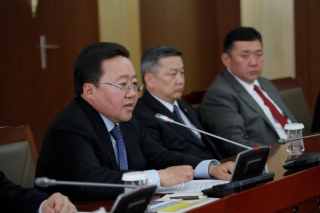ID :
372578
Fri, 06/26/2015 - 14:42
Auther :
Shortlink :
https://www.oananews.org//node/372578
The shortlink copeid
PRESIDENT:"FROM POLITICAL PARTIES TO POLICY PARTIES"

Ulaanbaatar /MONTSAME/ After having presented the new version of the law on June 24, the leader of Mongolia Ts.Elbegdorj highlighted an essence of the new version of the law on Political Parties.
He said this draft is the second most important. “Mongolia has no particular law on political parties. To share a good news, now we have the draft law”, he noted.
Firstly, the draft changes parties to “policy parties”. In specific, it assigns a political party with three main duties: to have its own research organization, to become a cadres-preparing institution, and to implement its action plan through being elected to state rule.
Secondly, the bill facilitates an accountability mechanism to monitor over the political parties. Record-keeping and monitoring mechanism will be changed and handed over to the central election body. So, the obligation for parties is to submit action plan implementation reports, twice a year, to the Central Election Commission. If a party has not been running in any stage of election for six years, the party will be suspended or will change its status.
Thirdly, some issues such as selecting cabinet members will be excluded from the scope of authority of party factions. Such power will only be granted by Prime Minister. However, selecting of PM will remain in the hands of political party factions. As such, the bill specifically determines the limitations of political party authorities and influences in the state organization’s activities.
Fourthly, the bill facilitates citizens with various options concerning a party membership. One can be a supporting member, who supports party’s actions without a registration to this party, another one can a permanent member or an elected member. The elected member is a person who is appointed to the party conference or the executive board. The draft also directs a citizen to have affiliation to one party only, and to provide information transparency about political parties’ memberships.
Fifthly, regarding the political parties’ finance, the bill regulates the parties to pursue “Glass Account” law and to have a single account. The state will give certain amount of financial incentives to political parties taking into account their roles in society. Moreover, expenditure of the incentives will also be monitored: 30 percent should be dedicated to policy researches, another 30–to capacity building, and 10 percent–to their subsidiary clubs and institutes.
Sixthly, actions of political parties will be limited. “It is high time we tackled problems related to political parties. By the draft new wording, these parties will be prohibited from opening branches in an administrative unit that has less than three thous.people, it means that some 60 percent of all soums will be freed from political impacts and pressure.
At seventh, political parties are to solve their problems themselves, without causing troubles to social and legal bodies of the country. It means that the political parties shall not be registered at court, and the court cannot intervene in their affairs, therefore, the court will be able to make purely independent decisions.
At eighth, the political parties will have a flexible system that gives them a right to change their structures and to appoint chairperson by a specific rule.
At ninth, the political parties will be prohibited having own NGO, factions and medals or orders, but it does not mean that clubs for women or youths are banned.
“The last point: All matters on capitals for the political parties purchased with state and local money will be resolved. Other controversial issues must be tackled as well, so two new laws are needed for the financing and structure of political parties and for the rule of maintaining this law,” said the President.





